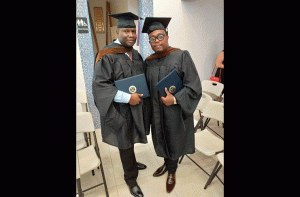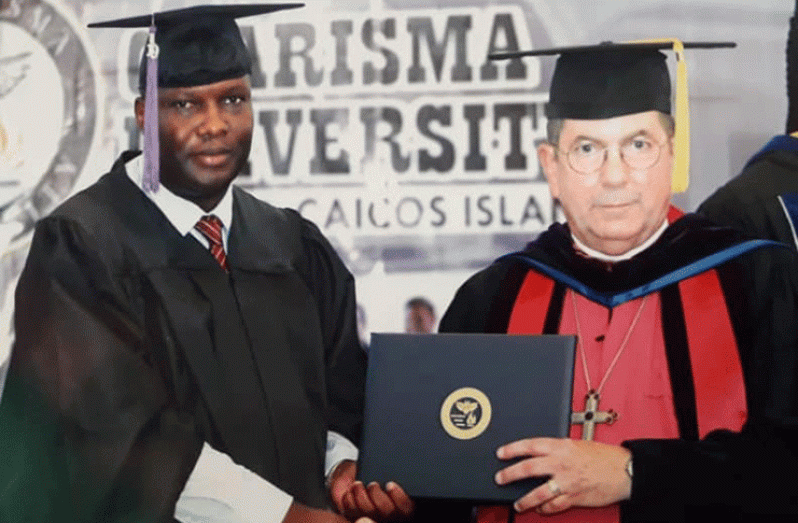– Commander Cooper advises colleagues
“EDUCATING and qualifying yourself in a changing organisation is the way forward as the Guyana Police Force (GPF) moves towards systematic development,” Commander of ‘D’ Division (West Bank/Coast/East Bank Essequibo), Senior Superintendent Edmond Cooper said.
The commander shared this perspective as a result of his recent graduation from the Charisma University, Turks and Caicos Islands, British West Indies, with a Masters of Arts in Legal Studies with a Major in Criminology.
“People expect the police to know. Police have to always be in the forefront of learning and learning never ceases, there is no second guessing when you have a wide scope of knowledge in all fields,” the commander told this publication in an exclusive interview.
The Senior Superintendent said that the GPF is changing and developing as Guyana attracts international eyes on its operations.
Prior to his recent achievement, Commander Cooper had completed a Degree in Law and several diplomas which include legal studies, private investigations and public safety and security.
When asked what motivated him to pursue criminology, the commander said he knew it was an important career choice and it was magnified when at a conference, he heard President David Granger make a request for officers to inquire the reasons behind why crimes are committed.

“In my humble view, a criminologist or a person who studied criminology would be in a position to assist the GPF in answering various questions, so that is why I ensured that I pursue such studies to enhance the force,” the Senior Superintendent explained.
He continued, “It was a very edifying programme and I learned a lot, and it widened my scope, and my eyes are opened to many new things which are taken for granted. I will continue to elevate myself.”
With 26 years of service under his belt, Cooper said 15 of those years he served as a court prosecutor and during his time he prosecuted many high-profile and sensitive cases.
“I have been successful in being a prosecutor and I would say it’s my specialty, I concentrate my area of discipline in the legal field and it is pivotal in understanding the concepts and laws to assist my colleagues, and advise citizens in many legal insights,” he shared.
Further sharing his perspective on law enforcement and criminology, Commander Cooper said “in criminology, examining why people commit crime is very important in the ongoing debate of how crime should be handled and prevented.”
In underscoring the many theories, the commander said people generally act in their self-interest and make decisions to commit crime after weighing the potential risks (including getting caught and punished) against the rewards.
In the social disorganisation theory, he said a person’s physical and social environments are primarily responsible for the behavioral choices that person make.
In particular, he said a neighborhood that has fraying social structures is more likely to have high crime rates. Such a neighborhood may have poor schools, vacant and vandalised buildings, high unemployment, and a mix of commercial and residential property.
“Most people aspire to always have money, but they don’t all have the same opportunities or abilities. When people fail to achieve society’s expectations through approved means such as hard work and delayed gratification, they may attempt to achieve success through crime,” the commander noted.
Commander Cooper also pointed out that people develop motivation to commit crime and the skills to commit crime through the people they associate with.
“Most people would commit crime if not for the controls that society places on individuals through institutions such as schools, workplaces, churches, and families,” he noted.
Commander Cooper said with his knowledge he is able to better police the division.
The commander also served as the Force’s Second-in-Command – Administration (ag.), Force Training Officer (ag.) and Commander ‘C’ Division. Before being elevated to those appointments, he performed duties in almost all of the policing divisions which includes Deputy Commander ‘A’, ‘B’ and ‘E’ Divisions; Officer-in-Charge Bartica, Officer-in-Charge Port Kaituima and the Officer-in-Charge of number one and number two sub-divisions – ‘C’ Division.




.png)









